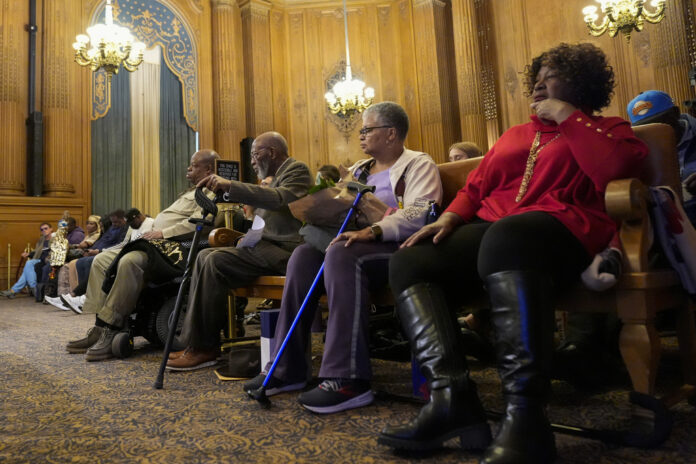
By CALMatters
(CALMATTERS) – As California becomes the first state to publicly grapple with the complexities of reparations, a conflict has emerged between reparations advocates and some lawmakers backing bills to implement a state task force’s recommendations.
Leading Black lawmakers are advancing different sets of bills, raising questions about whether they have competing visions. But the chairperson of the California Legislative Black Caucus on Wednesday said there’s no rift between caucus members, just a strategic discussion over which bills to prioritize this year.
“I wouldn’t describe it as an internal dispute at all,” said Assemblymember Lori Wilson, a Democrat from Suisun City in the outer Bay Area and chairperson of the coalition.
Many Republicans did not cast a vote on the recently proposed resolution to “acknowledge the harms and atrocities committed by representatives of the State of California who promoted, facilitated, enforced, and permitted the institution of chattel slavery and the legacy of ongoing badges and incidents of slavery that form the systemic structures of discrimination.”
Assemblymember Diane Dixon, a Republican from Newport Beach, said even though California in its early days “enacted a number of laws that intentionally discriminated against African Americans,” she was abstaining from voting in favor or against the measure because “today, we can be proud that California, in the second half … of the 20th century became a national leader in extending civil rights to African Americans and others.”
Dixon, 72, made her comments when the proposed legislation was before the Assembly’s judiciary committee on Feb. 20, adding she looked forward to “growing our knowledge in reading the reparations report.”
Forced labor in California
Some of the proposed legislation in the caucus’ reparations package were bills that previously failed, such as the measure to remove an exemption in California’s constitution that allows for forced labor. Critics say requiring incarcerated people to work, often for low pay, is a form of slavery, but state officials say prison workers save the state tens of millions of dollars.
Bradford said he urges all lawmakers to read the task force’s report or at least the executive summary. Several lawmakers say more education and public outreach are needed before some reparations measures can become a reality.
“We spent two years of our lives on this,” Bradford said, adding it cost taxpayers nearly $1 million for the task force hearings, research and report.
“And now, for legislators not to read it, I think it does a great disservice to taxpayers’ dollars that we went through this effort and the individuals who are now responsible for implementing what the report says are just ignoring it.”
Lodgson said that’s also where his group draws its sense of urgency.
“Two years of our lives, going to every hearing, hundreds of community meetings. We’re all volunteers. We come, and we spend our own money. We’ve got people breaking up with their girlfriends because they spend so much time on this,” he said. “Then to come to this year, and we’ve got bills like ‘We’re gonna get (California corrections officials) to tell us what books they’ve banned. We’re gonna apologize’… It’s not enough.”
Kamilah Moore, a reparatory justice scholar and attorney who served as the task force chair, said she supports all the bills — both the caucus’ and Bradford’s and other lawmakers — because every step in the right direction is positive.
“With all of these bills’ passage, it just creates a solid foundation for eventually a direct cash payments bill, maybe in the next legislative session,” she said.
Lawmakers say progress on the caucus’ slate is inching ahead.
In the last few weeks, Assembly and Senate committees took up several bills from the reparations slate.
One was a bill that would expand California’s original 2019 CROWN Act, barring hair discrimination in competitive sports.
Speaking before the committee the bill’s author, Assemblywoman Akilah Weber, described instances across the nation where Black teenagers have been told to cut their hair to continue playing soccer or softball.
“These are incredibly dehumanizing events,” said Weber, a Democrat from San Diego. “Our hair is a symbol of who we are.”

Weber said the legislation is personal because her son is beginning to consider how he wants to style his hair.
California lawmakers enacted the original CROWN Act (which stands for Create a Respectful and Open World for Natural Hair) in 2019 to prevent discrimination based on hairstyle and hair texture in schools and workplaces. It was the first such legislation passed at the state level. Since then 22 states have followed California’s lead, but similar federal bills have failed.
 Video Of The Week
Video Of The Week

